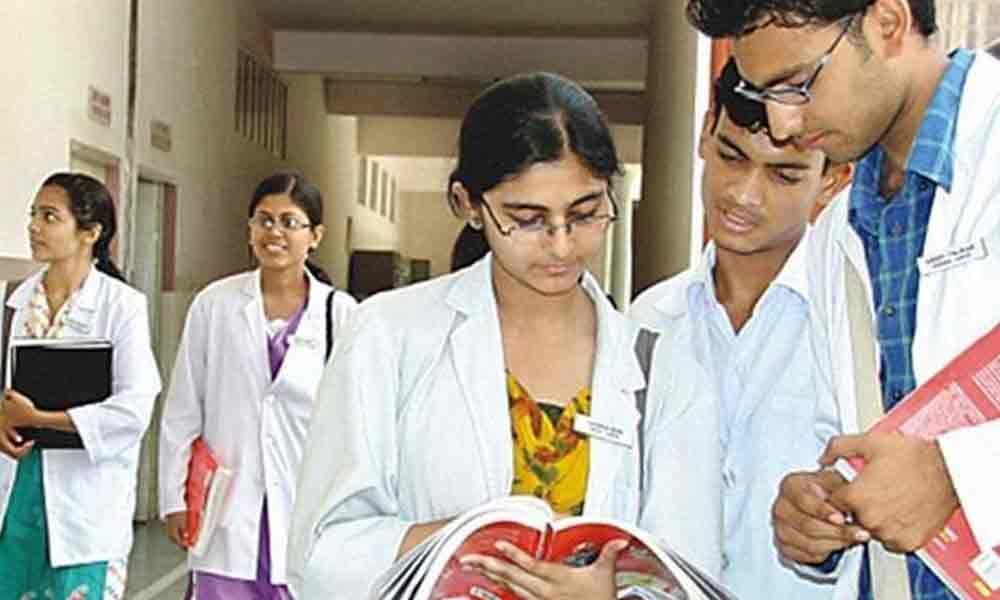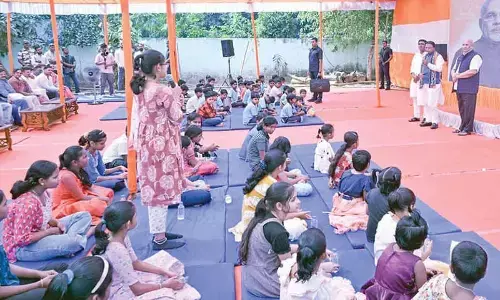New MBBS curriculum is game changer in healthcare system
 New MBBS curriculum is game changer in healthcare system
New MBBS curriculum is game changer in healthcare systemThe overall goal of undergraduate medical education programme as envisaged in the revised Graduate Medical Education Regulations is to create an "Indian Medical Graduate" (IMG) possessing requisite knowledge, skills, attitudes, values and responsiveness, so that she or he may function appropriately and effectively as a physician of first contact of the community while being globally relevant.
In order to fulfill this goal, the IMG must be able to function appropriately, ethically and effectively in roles as clinician, leader and member of the health care team and system, communicator, lifelong learner and as a professional. After a hiatus of 22 years, the Medical Council of India (MCI) has recognized the importance of training to medical students not just to be good doctors, but also good communicators.
The MCI is set to roll out a new MBBS syllabus nationally in the context of emerging diseases and scientific advances from August 2019. The new syllabus called 'Competency Based Undergraduate Curriculum', marks a radical shift from old times when rote and classroom learning was the norm in MBBS training and stress on doctor-patient relationship and medical ethics negligible, now new curriculum have dedicated topics on ethics, compassion, attitude and communication, which will be taught to medical graduates. India's new MBBS curriculum acknowledges the importance of ethics, responsiveness to needs of patients and families and fine communication skills to engage the ailing, for the first time.
The importance of ethics is greatly enhancing the diagnostic capability of a doctor, if the doctor is able to effectively communicate with the patient and his/her relatives decreasing frustration of the doctor and patient or relatives. It has been aptly stated that "Medicine is an art whose magic and creative ability have long been recognized as residing in the interpersonal aspects of patient-physician relationship.
The new MBBS curriculum has a course called Attitude, Ethics and Communication (AETCOM) which will run across years. Students will be assessed for how they communicate with patients; how they counsel people for organ donations or other challenging procedures; how sensitively do they offer care and obtain consent. All these things will count along with competencies and skills. Apart from above, it also covers lot of ground in Public Health, Organ Donation, Mental Health and Communication.
The new curriculum is an outcome-based learning that skills a medical graduate is expected to have. At first instance, the course is introduced in the first year itself to receive clinical exposure. Instead of jumping straight away into core subjects such as anatomy, physiology, classes will begin with a two-month 'Foundation Course' aimed at orienting a medical student to MBBS programme. Classes will begin with teachers explaining the history of medicine. Other necessary skills such as language and communication will also be taught.
This course eases out students' frustration in learning and make them to cope in further years of the course. Students have in the past committed suicide under pressure of learning or language and due to inability to cope. The foundation course seeks to prepare students for the MBBS duration. The new syllabus covers about professionalism, altruism and respect in professional relationships.
Moreover, the syllabus also attempts to allow students from diverse educational streams and backgrounds to transition appropriately through a foundation course and also dedicated time to pursue co-curricular activities.
Another feature of the curriculum is opting of elective subjects. Now students can pick up subjects of choice and dedicated time has been allotted for self-directed learning and co-curricular activities.
The new curriculum also encourages, in a first, the use of medical mannequins and models for clinical learning even though the use of human cadavers for anatomy training will continue. Theory classes will be reduced to a minimum. Two-thirds of the course shall include interactive, practical or clinical or based on group discussions.
The learning process will be problem-oriented and activities emphasizing hands-on training such as community healthcare activities and others will be encouraged. The new curriculum regulations are more learner-centric, patient-centric, gender-sensitive, outcome-oriented and environment appropriate. The result is an outcome-driven curriculum which conforms to global trends," according to MCI document, which allows integration of subjects horizontally and vertically rather than the previous practice of teaching in silos.
The experts say, the introduction of these long-due changes is a welcome move and these changes could go a long way in fulfilling the lack of qualified medical professionals in India. It is no hidden fact that the doctor-patient relationship has not been equal and instilling empathy in medical graduates and making them good communicators will surely improve this relationship.
Community engagement has been limited to individual initiatives by doctors who go out of their way to bridge the gap. It is hoped that this new curriculum focusing on practical knowledge and student attitudes will prove to be a game-changer and play a major role in improving India's healthcare system.
They also say, the curriculum provides for early clinical exposure, electives and longitudinal care. It also reinforces skills training by necessitating certification of certain essential skills. Use of skills labs, simulated and guided environments has been allowed for this purpose.
But the focus on student attitudes towards patients is a game-changer in the new curriculum in times when globally relevant medical graduates are naturally expected to have empathy. In India, the doctor-patient relationship has been historically unequal. The new syllabus seeks to correct that imbalance, the experts opined.














